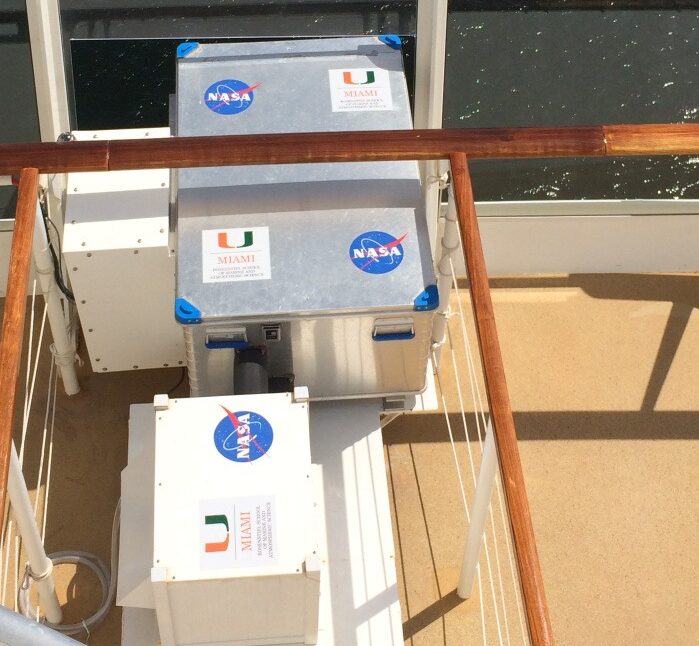Royal Caribbean Group is capturing critical ocean conservation data onboard ships
Strengthening a decades-long commitment to ocean conservation and environmental research efforts, Royal Caribbean Group has announced a four-year extension of its investment in the OceanScope project
The open-source data programme provides scientists with critical information to study climate and ocean conservation. It is part of a collaboration between Royal Caribbean Group and key programme partners including the University of Miami Rosenstiel School of Marine, Atmospheric, and Earth Science, NASA, and the National Oceanic and Atmospheric Administration (NOAA).
The renewal was announced on World Oceans Day, building on over 20 years of groundbreaking ocean and marine life research from Royal Caribbean Group ships.
About the project
OceanScope leverages a unique, comprehensive suite of oceanographic and meteorological instruments, located onboard Royal Caribbean Group ships, that generates continuous, simultaneous collection of the ocean’s vital signs such as the structure of currents, sea surface temperature, carbon dioxide concentrations, and salinity taken along the repetitive ship routes – which allows scientists to monitor changes on scales of seasons, years, and even decades.
The programme’s open-source database is available to the international scientific research community worldwide. The resulting data products and peer-reviewed research are key to informing ocean and conservation policy.


“At Royal Caribbean Group, every day is World Oceans Day – and we are thrilled to renew a programme as impactful to oceanic research as OceanScope,” said Jason Liberty, president and CEO, Royal Caribbean Group. “We’re dedicated to sustaining our planet and delivering the best vacations, responsibly – and our decades-long support of this unique initiative is testament to that. We can’t wait to see how OceanScope, and our scientific collaborators progress our understanding of ocean health and conservation.”
Launched in 2002, the programme helped verify for the first time that ocean acidification – a reduction in pH over an extended period of time caused primarily by uptake of carbon dioxide from the atmosphere was occurring in the Caribbean Sea but at varying rates. Ocean acidification is detrimental to calcifying organisms such as oysters, clams, sea urchins, shallow water corals, deep sea corals, and calcareous plankton, and an ongoing concern for the entire food web.
Extending OceanScope on Royal Caribbean Group ships helps ensure ongoing monitoring and changes of key ocean and atmospheric processes in critical ecosystems.
“We are most grateful to renew our successful collaboration with Royal Caribbean Group,” said Dr Peter Ortner, research professor of marine biology and ecology at the University of Miami Rosenstiel School of Marine, Atmospheric and Earth Science. “This is an extraordinary example of how private industry, academic research institutions, and government agencies are collaborating to amass an incredibly valuable dataset highlighting the intricate connection between the ocean, atmosphere, and climate.”
As of 2023, data has been collected from over 100,000 nautical miles sailed from four ships, traveling across the Caribbean Sea, Galapagos, North Atlantic and Mediterranean Sea.
Royal Caribbean International’s Allure of the Seas and Adventure of the Seas and Celebrity Cruises’ Celebrity Flora and Celebrity Equinox are currently providing data to scientists at NOAA, the University of Miami Rosenstiel School, and the community at large. Royal Caribbean Group intends to share the programme’s learning to its more than eight million guests annually in an effort to increase ocean literacy.
“NASA is excited to revive its long-standing partnership with OceanScope, which is a valuable player in the Agency-led efforts to understand Earth climate today, and inform humanity for what waits tomorrow,” said Dr Nadya Vinogradova Shiffer, lead of NASA’s Climate Variability and Change Focus Area and programme director of the NASA Ocean Physics programme at NASA HQ, Washington DC. “Looking at Earth’s ocean’s from space and leveraging in situ observations enabled by projects like OceanScope is what allows us to build robust knowledge of ocean’s role in climate, which controls our planet’s heat, energy, and water.”
Royal Caribbean Group’s conservation work extends beyond OceanScope, with the company championing a broader commitment to sustaining the planet as part of its SEA the Future platform.
Royal Caribbean Group is actively working to decarbonise its business through innovation, collaborative partnerships and a transition to cleaner fuels, smarter technologies, and improved energy efficiencies. Ultimately, the company’s efforts are driving toward – Destination Net Zero – a commitment to reach net-zero by 2050 and to deliver a net-zero emissions cruise ship by 2035.
